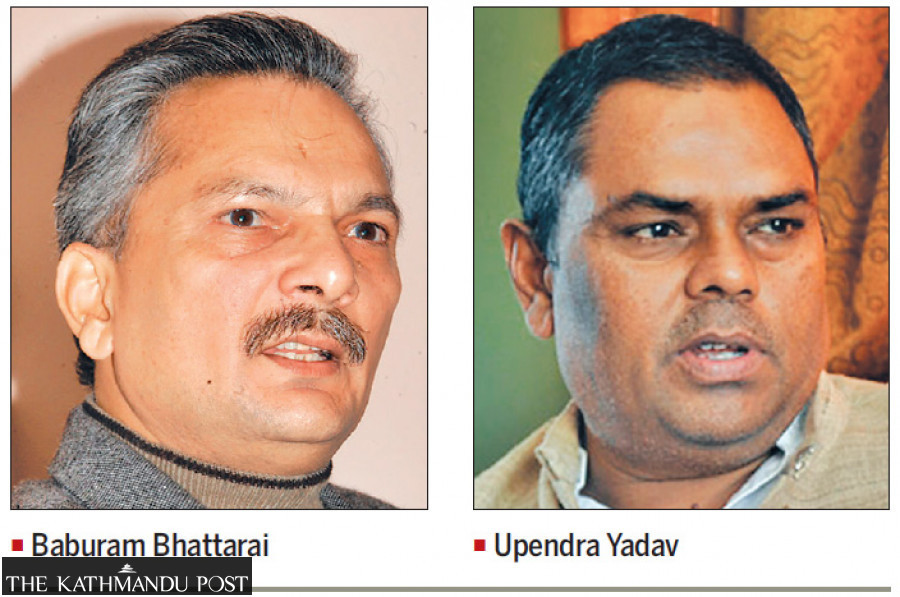
The Bhattarai faction has been accusing Yadav of running the party single-handedly, ignoring the party leaders. Post File Photos
The central executive committee meeting of the Janata Samajbadi Party scheduled for Friday, amid increasing differences within the factions, is likely to be crucial for setting the future course of the party.
Party chair Upendra Yadav has called the central executive committee meeting after constant pressure from dissident leaders. Despite repeated demands from the faction led by the party’s Federal Council chair Baburam Bhattarai for the meeting, Yadav had been ignoring the call. But he called the meeting after leaders from the Bhattarai faction threatened to start a signature campaign to press for the meeting. Janata Samajbadi is currently the fifth largest party in parliament.
Party leaders say Yadav is trying to limit the meeting’s agenda to the Millennium Challenge Corporation Nepal Compact and the party’s registration in the Election Commission for the local elections. “However, there are plenty of other issues regarding the leadership that need to be discussed and sorted out,” Prashant Singh, a member of the committee, told the Post. “The chairperson needs to change his work style and employ a consultative approach in decision-making. He should not be imposing his whims on the party.”
The party has not met since the Mahantha Thakur faction split to form the Loktantrik Samajbadi Party in August last year. The Bhattarai faction has been accusing Yadav of running the party single-handedly ignoring the party leaders.
When the Janata Samajbadi Party was formed after a merger between the Samajbadi Party Nepal and the Rastriya Janata Party Nepal in April 2020, it decided to adopt a collective leadership system. Yadav and Thakur were party chairs while Bhattarai was appointed Federal Council chairperson. With Thakur forming a new party last year, a position of chair is vacant.
The Bhattarai faction has been demanding that party leader Ashok Rai be appointed to the vacant position of chairman arguing this will make the leadership regionally inclusive as Yadav represents the Madhesi community, Bhattarai Khas-Arya, Rai will represent the indigenous community. However, Yadav hasn’t heeded their concerns.
“The differences are not new to the party. Friday’s meeting will discuss several important issues,” Mohammad Istiyak Rai, another member of the committee, told the Post. “I am hopeful that the meeting will be instrumental in strengthening unity in the party.”
Their differences escalated after Yadav picked ministers in the incumbent Sher Bahadur Deuba government without consulting the party. Similarly, the Bhattarai faction wasn’t happy with the party’s candidates for the National Assembly elections held last month. The party had fielded two candidates but one of them lost the elections. All the candidates of the remaining four parties in the ruling alliance were elected to the National Assembly.
Leaders from the Bhattarai faction were dissatisfied with Yadav’s decision to settle for two candidates during the power-sharing agreement in the alliance. It was for demanding three candidates one each in Province 1 and Madhes and Lumbini Province.
The party’s leaders say they expect that the executive committee will take an appropriate decision on practising a collective leadership system in the party and also come up with the party’s official position on the MCC compact.
“The meeting hopefully takes some decision regarding collective leadership which will be endorsed by the central committee,” Ganga Shrestha, another member of the committee, told the Post. As Yadav has been single-handedly taking decisions on behalf of the party, the leaders from the Bhattarai-faction are preparing to demand that Yadav share the executive authority with Bhattarai.
Singh complained that Yadav has violated their initial understanding to make the party inclusive and going by the existing trend the party could be confined to a few Tarai districts after the upcoming elections. He says Yadav has failed to transform the party into a national inclusive force and the latter’s unilateral decision-making is largely responsible for the failure. “There are fears that Yadav will monopolise election ticket distribution if the executive authority is not shared with Bhattarai immediately,” said Singh. “We are at the point of no return. We will strongly raise these issues and whether the party remains intact or splits depends entirely on Yadav.”
However, some of the party leaders dismissed the notion that the party is on the brink of split. They said there are differences and they can be sorted out through dialogue. “I don’t think the party will split,” Rai, a party’s senior leader, told the Post. “We will find a solution through dialogue.”













